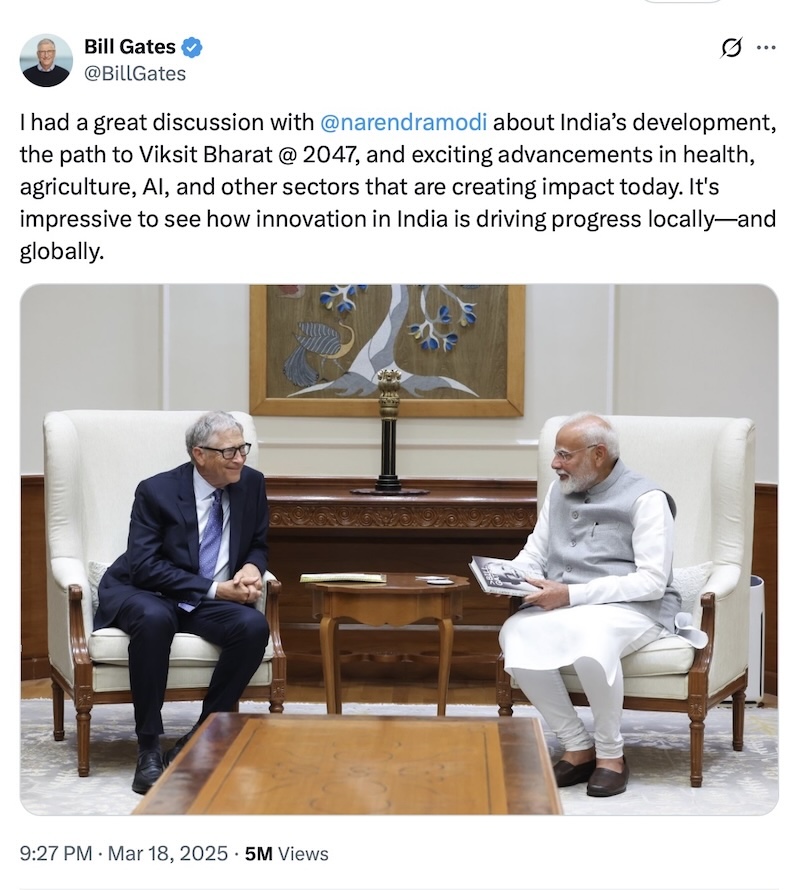
By Colin Todhunter
In late 2024, Bill Gates sparked outrage in India after describing the country as “a kind of laboratory to try things” during a podcast with Reid Hoffman. Gates emphasised the nation’s stability as a “testing ground” for global initiatives.
His remarks were widely condemned. Social media erupted, with many Indians accusing Gates of reducing their nation to a mere experimental ground for Western interests. Social media users labelled Indians as “guinea pigs” in Gates’ laboratory and questioned the ethics and motives behind such experimentation.
A widely reported response on X captured the sentiment:
“India is a laboratory, and we Indians are Guinea Pigs for Bill Gates. This person has managed everyone from the Government to opposition parties to the media. His office operates here without FCRA, and our education system has made him a hero! I don’t know when we will wake up!”
(FCRA refers to the Foreign Contribution (Regulation) Act, which regulates foreign contributions to ensure they are not detrimental to the national interest.)
The controversy resurfaced with the 5 May 2025 announcement that India became the first country to officially release two genome-edited rice varieties: Kamala (DRR Dhan 100 Kamala) and Pusa DST Rice 1. These are not classified as genetically modified (GM) crops. Unlike traditional GM crops, which deliberately introduce foreign DNA, these gene-edited varieties use CRISPR-Cas SDN-1 and SDN-2 technologies, which are often claimed not to introduce foreign DNA but only to alter existing genes.
While this claim does not stand up to examination,* the supposed distinction is heavily promoted by the agri-biotech industry in an attempt to ensure gene-edited crops bypass strict biosafety regulations and multi-year field trials required for GM crops. In 2022, the Indian government exempted such plants from hazardous substances rules under the Environment Protection Act.
Exempting gene-edited crops from rigorous biosafety assessments raises concerns about potential health and environmental risks. Despite this technology being praised by industry for its ‘precision’, this has more to do with PR than science. Even small genetic changes can have unpredictable effects. Indeed, Harvard biotechnologist George Church described CRISPR as “a blunt axe”, warning of serious unintended consequences and risks.
Critics argue that transparent, independent testing is essential before widespread adoption of gene-edited crops. The current regulatory exemption in India is seen as premature and potentially unlawful, especially as the Supreme Court continues to scrutinise agricultural gene editing. Campaigners claim regulatory agencies are under pressure from biotech interests to bypass safety protocols and marginalise public and scientific scrutiny.
Even though these varieties were developed by the ICAR (Indian Council for Agricultural Research), civil society groups, notably the Coalition for a GM-Free India, highlight that gene-editing tools like CRISPR/Cas9 are proprietary technologies, raising concerns about seed sovereignty and farmers’ rights. The underlying patents could increase corporate control over Indian agriculture and undermine farmers’ traditional rights to save and exchange seeds.
Concerns about proprietary rights and IPR are central to the criticism of gene-edited rice in India. The debate extends beyond biosafety and environmental risks to broader issues of farmer autonomy, seed sovereignty and the shift of control from public institutions to private patent holders.
Critics demand transparency regarding the intellectual property status of these new rice varieties and question the use of public resources via the ICAR in developing crops that may primarily benefit corporate interests. The lack of public disclosure about the development process, safety data and intellectual property details of these varieties is deeply problematic.
Veteran campaigner Aruna Rodrigues, who has long opposed GM crop commercialisation in India, warns that the government is repeating past mistakes (such as the failure of Bt cotton in the country; see Bt cotton in India is a GMO template for a monumental irreversible catastrophe) by pushing inadequately tested technologies without proper oversight. She has exposed regulatory failures, including the commercial release of herbicide-tolerant (HT) basmati rice without proper approval, calling such actions illegal and a violation of rules governing hazardous and genetically engineered organisms (see the article Bayer loves Basmati).
She has also warned that the ICAR’s actions jeopardise India’s lucrative organic rice export market and flout a Supreme Court-appointed Technical Expert Committee (TEC) recommendation for a complete ban on HT crops due to their environmental risks.
Rodrigues argues that regulatory agencies have grave conflicts of interest, with government bodies both promoting and overseeing GM and gene-edited crops, resulting in regulatory capture by corporate interests. The Ministry of Science and Technology, Ministry of Agriculture and the ICAR all actively promote GM food crops and now gene-edited crops, while they are simultaneously charged with their oversight.
Aruna Rodrigues argues that there has been a wholesale capture of the regulatory apparatus by corporate interests, with government agencies acting as handmaidens to the biotech industry.
The Coalition for a GM-Free India and Rodrigues have repeatedly exposed failures and conflicts of interest within India’s biosafety authorities. The aforementioned TEC found major gaps in biosafety assessment and called for regulatory overhaul, yet these issues remain unaddressed many years later.
Proponents of gene-edited rice repeat claims made for GM crops: boosting yields, feeding the hungry, helping farmers and tackling climate issues. Such narratives are deliberately misleading and serve as talking points with the aim of opening India’s agrifood system to corporate control. Indian farmers’ distress is rooted in policy failures, not low productivity, and agroecological, smallholder-based systems have proven benefits (see Challenging the flawed premise behind pushing GMOs into Indian agriculture) in terms of climate and stress resilience and yield.
Claims of yield increases with gene-edited rice echo previous unfulfilled promises of GM crops, overlooking existing high-yielding indigenous varieties that have already contributed to substantial rice production.
The Coalition for a GM-Free India and farmer representatives challenge the claims that the two gene-edited rice varieties will lead to 25-30% yield increases, citing a lack of transparent, publicly available field trial data. They demand accountability and real-world testing, noting that India already has surplus rice production and that unverified yield claims cannot justify introducing risky gene-edited crops. The deregulation of gene-editing techniques without biosafety testing is deemed illegal and unscientific, casting doubt on the credibility of yield improvement claims.
We have seen wild claims about yield increases before in India. Developers of GM mustard at Delhi University made similar claims that were debunked via a series of affidavits submitted by Aruna Rodrigues to the Supreme Court.
Opponents accuse the government of yielding to corporate lobbying and portraying gene editing as precise and safe, despite a good deal of scientific literature highlighting risks and uncertainties (documented at length on the (GMWatch.org website). India’s embrace of gene-edited crops, encouraged by figures like Bill Gates and facilitated by compromised regulatory authorities, is a case of corporate capture and regulatory subversion.

Bill Gates, a long-time advocate of genetically engineered crops, met with PM Modi in March 2025, shortly before the government’s announcement of gene-edited rice. While the sequence of events may be coincidental, Gates’s influence on agricultural biotechnology is well established. India’s future food security and ecological health depend on resisting unproven technologies and restoring regulatory integrity free from corporate and philanthropic-plutocratic influence.
Gates is often treated as royalty by the media and politicians due to his wealth, but his techno-solutionist ideology reduces complex social, political and economic problems to technical fixes. Too often, this wilful ignorance leads to “testing grounds” for interventions facilitated by co-opted governments and regulators that ultimately serve to concentrate power in the hands of corporate interests. Meanwhile, genuine solutions are sidelined and denigrated.
Many of the issues in the article above are covered in the author’s open-access online book Power Play: The Future of Food. Bagha Books is now distributing print copies (Hindi and English) to civil society groups, educational institutions and interested readers in India.
* Colin Todhunter's original article read: "Unlike traditional GM crops, which introduce foreign DNA, these gene-edited varieties use CRISPR-Cas SDN-1 and SDN-2 technologies to alter existing genes." Since gene-edited organisms can and do contain foreign DNA, Colin agreed to GMWatch's correction, in the wording above.
Colin Todhunter's original article was published on Off-Guardian and is reprinted on GMWatch with kind permission of the author.
Colin Todhunter specialises in food, agriculture and development and is a research associate of the Centre for Research on Globalization in Montreal. You can read his two free books: Food, Dependency and Dispossession: Resisting the New World Order; and Sickening Profits: The Global Food System’s Poisoned Food and Toxic Wealth here.
Banner image: Shutterstock (licence available on request)










